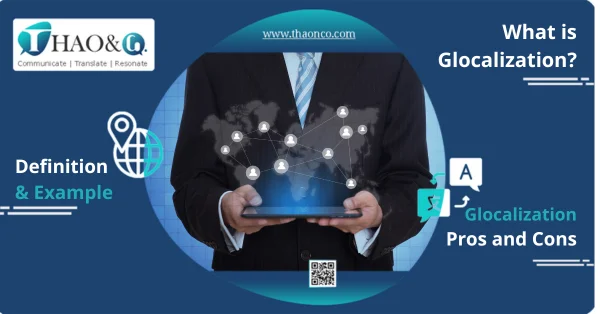Businesses seeking to expand on the international level will often be confronted with the issue of striking the perfect balance between standardization and diversification in local markets.
Thus, the concept of Glocalization emerges, representing a unique and flexible approach. But what is Glocalization? Why has this strategy become a crucial factor in the success of organizations and companies in the global market?
In this article, Thao & Co. will explore in-depth the concept of ‘glocalization’ and provide illustrative examples to help you gain a better understanding of its significance in the business world nowadays.
Glocalization is a concept combining the words ‘global‘ and ‘local,’ representing the integration of global and local elements in a multinational business.
Glocalization is the creation and adaptation of products, services, and business strategies to meet the needs and cultural nuances of each specific market.
Instead of applying a uniform global model, glocalization allows companies and organizations to tailor products and services to the requirements and preferences at the local level.
Glocalization may involve altering product designs, language, marketing localization strategies, advertising styles, customer service approaches, and many other factors to align with the culture and preferences of a specific market.
Glocalization aims to help brands cultivate positive experiences with local customers while preserving their core values and global identity.
Glocalization is a crucial strategy in international business, particularly in the retail and e-commerce sectors. It enables enterprises to move towards global goals while adapting to local requirements in diverse markets worldwide.

Glocalization is an innovative business strategy that combines global essence with local uniqueness. Glocalization allows businesses to create customized products and services tailored to the needs and preferences of each specific market.

The first advantage lies in the high level of adaptability glocalization brings to the table. With glocalization, companies stand to gain a more in-depth understanding of local culture and customer preferences, fueling the cultivation of individualized experiences and a loyal customer base. All of the points mentioned above will serve to facilitate and optimize the market expansion of any business.
Glocalization also gives businesses a competitive edge. Instead of competing with numerous counterparts in an already crowded market space, glocalization helps companies carve out a spot for themselves with unique and innovative touches. By adapting to local requirements, businesses can address unexplored needs and provide solutions for customers.
Furthermore, glocalization also helps businesses be more cost-efficient. From manufacturing to the sales process, sourcing the business operations locally can significantly cut down on transportation and production fees. In addition, taking advantage of readily available resources can help companies generate more revenue and satisfy both local and international demands.
Finally, glocalization provides flexibility and rapid adaptability along with the customization of products and services. As a result, businesses can swiftly respond to new demands and changes in the market, thereby maintaining a strong foothold in an ever fluctuating market.
Some limitations of glocalization include:
Local dependency:
Glocalization demands a profound understanding of the local market, culture, and regulations. Therefore, businesses may have to invest additional time and resources in the research and fine-tuning processes.
Complex coordination and management:
The glocalization process demands meticulous coordination and management between global and local activities. This poses a challenge in maintaining consistency and quality control of products and services across multiple markets.
Risk of inconsistency:
Glocalization can lead to inconsistent product quality and unanticipated local variations. Economic, political, or social instability in each region can impact the business operations and investments of the enterprise.
Risk of reduced global recognition:
In the process of customization to fit local markets, there is a risk of losing the brand’s global identity. Therefore, it requires careful balance to ensure that the customization process does not diminish the value and identity of the brand internationally.
Despite the drawbacks, glocalization, with its local adaptability, enhanced competitiveness, cost optimization, and flexibility, remains an attractive and effective strategy to assert global value in today’s business.
To cater to the preferences and culture of Indians, McDonald’s deftly devised a special menu exclusive to India which includes vegetarian options and non-beef items.
McDonald’s replaced beef with chicken in burgers and introduced dishes such as McAloo Tikki (a potato and bread burger) and McPaneer (a cheese and bread burger). McDonald’s also decorated its stores in a distinctly Indian style, providing a catering experience that resonates with the local culture.
Embarking on overseas expansion, the fast-food giant made similar adaptations for its operations in other markets such as China and Japan.
In China, the McDonald’s menu comes with traditional Chinese dishes such as Baozi and McSpicy Chicken. In Japan, items such as Teriyaki Burger and Ebi Filet-O (shrimp burger) were also introduced. McDonald’s stores are furnished in a Japanese style to foster a connection with local customers.
Despite the emphasis on localization, the distinctiveness of McDonald’s still shines through, leaving a strong and recognizable imprint.
McDonald’s has maintained its logo and brand identity over decades; regardless of where it is found, McDonald’s logo is consistently used to identify the brand’s restaurants. Furthermore, unique recipes and culinary styles are employed by McDonald’s to ensure the taste and quality remain consistent across its entire menu.
Fast service and simple ordering have become a crucial part of the customer experience. Therefore, McDonald’s has made sure that customers can expect the same quality of service in all of its restaurants.
It is also important to note McDonald’s clever utilization of global marketing campaigns to not only enhance its brand image but also ensure that it remains consistent. Their advertisements often focus on joy, family, and goal-oriented aspirations, creating a universally recognizable message that resonates with consumers worldwide.
Thanks to the glocalization strategy, McDonald’s has been able to resonate and attract local customers in whatever market they operate in. Glocalization has also paved the way for McDonald’s reign in the fast-food industry.
Glocalization is crucial in building a successful strategy in the international market. Here are some considerations when implementing Glocalization.
Key points when implementing glocalization:
With Thao & Co.’s professional B2B translation services, you can leverage global business opportunities and build a successful glocalization strategy to conquer the international market.

Thao & Co. consistently incorporates high quality and utmost precision into your projects, regardless of text and document, or advertising-marketing translation, catering to languages of your desire. We provide translation and localization services to support businesses in their market expansion.
Furthermore, our Consumer Language Research© service has acquired a longstanding reputation, paving the way for the befitting growth of your business. Not only does this harmonize your business with regional cultures, but it also helps entice the local customer base.
Are you eager to discover what Thao & Co. has to ripen your business? Please drop your request on the Get A Quote page. Our specialists are at hand to offer unflagging support as soon as possible.